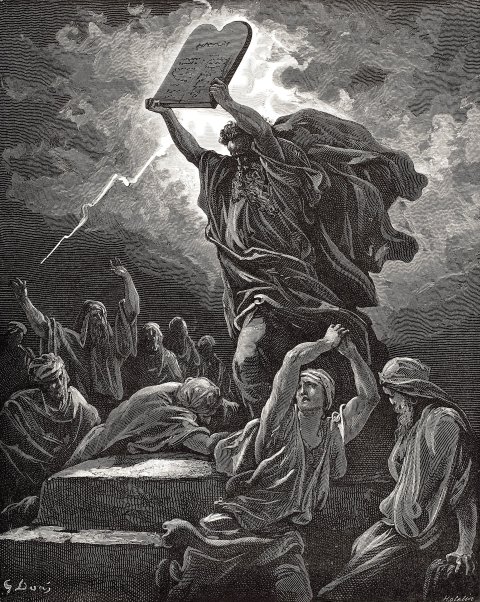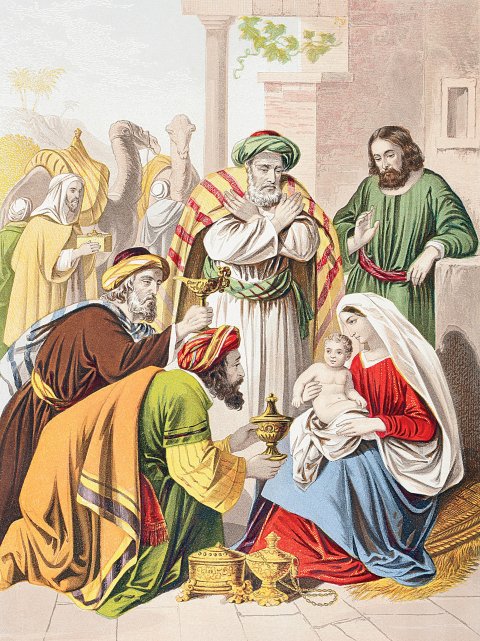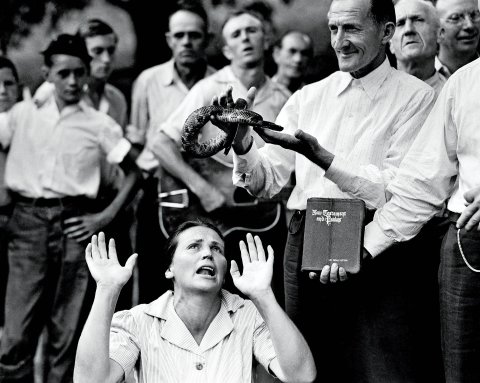I Have Been Told the Bible Is in the Past Why Should We Read It What Should I Answer
They wave their Bibles at passersby, screaming their condemnations of homosexuals. They fall on their knees, worshipping at the base of granite monuments to the Ten Commandments while demanding prayer in school. They entreatment to God to save America from their political opponents, more often than not Democrats. They gather in football game stadiums by the thousands to pray for the state'due south salvation.
They are God'south frauds, deli Christians who choice and choose which Bible verses they listen with less care than they exercise in selecting side orders for luncheon. They are joined past religious rationalizers—fundamentalists who, unable to find Scripture supporting their biases and beliefs, twist phrases and alter translations to evidence they are honoring the Bible's words.
This is no longer a thing of personal or individual faith. With politicians, social leaders and even some clergy invoking a volume they seem to have never read and whose phrases they don't sympathize, America is existence besieged by Biblical illiteracy. Climate change is said to be impossible because of promises God made to Noah; Mosaic law from the Sometime Testament directs American government; creationism should be taught in schools; helping Syrians resist chemical weapons attacks is a sign of the terminate times—all of these arguments have been advanced by modern evangelical politicians and their brethren, yet none of them are supported in the Scriptures as they were originally written.
The Bible is not the book many American fundamentalists and political opportunists call up it is, or more precisely, what they desire it to be. Their lack of knowledge about the Bible is well established. A Pew Research poll in 2010 found that evangelicals ranked only a smidgen college than atheists in familiarity with the New Testament and Jesus'south teachings. "Americans revere the Bible—merely, past and big, they don't read it,'' wrote George Gallup Jr. and Jim Castelli, pollsters and researchers whose work focused on religion in the United states. The Barna Group, a Christian polling firm, found in 2012 that evangelicals accepted the attitudes and beliefs of the Pharisees—religious leaders depicted throughout the New Testament every bit opposing Christ and his bulletin—more than they accepted the teachings of Jesus.
Newsweek's exploration here of the Bible'south history and meaning is not intended to advance a particular theology or debate the existence of God. Rather, it is designed to shine a light on a volume that has been abused past people who claim to revere it but don't read it, in the process creating misery for others. When the illiteracy of cocky-proclaimed Biblical literalists leads parents to blackball children from their homes, when it sets neighbor against neighbor, when it engenders hate and condemnation, when information technology impedes science and undermines intellectual advancement, the topic has get too important for Americans to ignore, whether they are deeply devout or tepidly true-blue, believers or atheists.
This examination—based in large part on the works of scores of theologians and scholars, some of which dates dorsum centuries—is a review of the Bible's history and a recounting of its words. It is only through accepting where the Bible comes from— and who put it together—that anyone can comprehend what history's most important book says and, just as important, what it does not say.

Playing Telephone with the Word of God
No television preacher has ever read the Bible. Neither has any evangelical politico. Neither has the pope. Neither have I. And neither have you. At best, nosotros've all read a bad translation—a translation of translations of translations of hand-copied copies of copies of copies of copies, and on and on, hundreds of times.
Virtually 400 years passed between the writing of the start Christian manuscripts and their compilation into the New Testament. (That's the same amount of time between the arrival of the Pilgrims on the Mayflower and today.) The starting time books of the Erstwhile Testament were written 1,000 years before that. In other words, some 1,500 years passed betwixt the day the showtime biblical author put stick to clay and when the books that would become the New Testament were called. There were no printing presses beforehand or until ane,000 years later. There were no vacuum-sealed technologies to preserve paper for centuries. Stale dirt bankrupt, papyrus and parchment crumbled away, archaic inks faded.
Back and so, writings from one era could be passed to the next merely past copying them by manus. While at that place were professional scribes whose lives were dedicated to this grueling work, they did non start copying the letters and testaments about Jesus's time until centuries afterward they were written. Prior to that, amateurs handled the task.
These manuscripts were originally written in Koiné, or "common" Greek, and non all of the amateur copyists spoke the language or were even fully literate. Some copied the script without understanding the words. And Koiné was written in what is known as scriptio continua—significant no spaces between words and no punctuation. Then, a judgement like weshouldgoeatmom could be interpreted equally "We should get swallow, Mom," or "We should get swallow Mom." Sentences can accept different meaning depending on where the spaces are placed. For example, godisnowhere could be "God is now here" or "God is nowhere."
None of this mattered for centuries, because Christians were certain God had guided the hand non only of the original writers merely too of all those copyists. But in the past 100 years or so, tens of thousands of manuscripts of the New Testament take been discovered, dating back centuries. And what biblical scholars now know is that later on versions of the books differ significantly from before ones—in fact, even copies from the same time periods differ from each other. "There are more than variations among our manuscripts than at that place are words in the New Testament," says Dr. Bart D. Ehrman, a groundbreaking biblical scholar and professor at the University of North Carolina who has written many books on the New Attestation.
Most of those discrepancies are piffling more than the handwritten equivalent of a typo, but that error was then included by future scribes. There were also minor changes made by literate scribes centuries afterwards the manuscripts were written because of what they decided were flaws in the accounts they were recopying. For example, an early version of Luke 3:16 in the New Attestation said, "John answered, saying to all of them.…" The problem was that no one had asked John anything, so a fifth century scribe stock-still that by changing the words to "John, knowing what they were thinking, said.…" Today, most modern English Bibles take returned to the correct, notwithstanding disruptive, "John answered." Others, such every bit the New Life Version Bible, employ other words that newspaper over the inconsistency.
Simply this discussion is about something much more important than whether some scribe in the Middle Ages decided God had not been paying attention while guiding the mitt of Luke. Indeed, there are significant differences in copies that impact far more than profound issues. Scribes added whole sections of the New Testament, and removed words and sentences that contradicted emerging orthodox beliefs.
Take 1 of the about famous tales from the New Testament, which starts in John 7:53. A group of Pharisees and others bring a woman caught committing adultery to Jesus. Nether Mosaic Law—the laws of Moses handed down in the Old Testament—she must be stoned to death. The Pharisees enquire Jesus whether the adult female should be released or killed, hoping to forcefulness him to choose between honoring Mosaic Law and his teachings of forgiveness. Jesus replies, "He that is without sin among you, let him first cast a stone.'' The grouping leaves, and Jesus tells the woman to sin no more.

Information technology's a powerful story, known even by those with just a passing knowledge of the Bible. It was depicted in Mel Gibson's movie The Passion of the Christ and is often used to signal out the hypocrisy of Christians who denounce what they perceive to be the sins of others. Unfortunately, John didn't write information technology. Scribes made it up sometime in the Eye Ages. It does not announced in any of the iii other Gospels or in whatsoever of the early on Greek versions of John. Even if the Gospel of John is an infallible telling of the history of Jesus's ministry building, the event simply never happened. Moreover, according to Ehrman, the writing style for that story is dissimilar from the balance of John, and the section includes phrases that practise not appear anywhere else in the Bible. Scholars say they are words more commonly used long after that Gospel was written.
For Pentecostal Christians, an important section of the Bible appears in the Gospel of Marking, 16:17-18. These verses say that those who believe in Jesus will speak in tongues and take extraordinary powers, such every bit the ability to cast out demons, heal the sick and handle snakes. Pentecostal ministers often babble incomprehensible sounds, proclaiming—based in function on these verses in Marking—that the noises they are making testify that the Holy Spirit is in them. It's also a primary justification for the emergence of the Pentecostal serpent-handlers.
But once once more, the verses came from a creative scribe long afterwards the Gospel of Mark was written. In fact, the primeval versions of Marker terminate at 16:8. It's an bad-mannered ending, with three women who accept gone to the tomb where Jesus was laid afterwards the Crucifixion encountering a man who tells them to let the disciples know that the resurrected Jesus will see them in Galilee. The women flee the tomb, and "neither said they any affair to any man; for they were afraid.''
In early copies of the original Greek writings, that's it. The 12 verses that follow in modern Bibles—Jesus actualization to Mary Magdalene and the Disciples and then ascending to Sky—are not there. A significant moment that would be hard to forget, 1 would think.
The aforementioned is true for other critical portions of the Bible, such as 1 John 5:vii ("For there are 3 that comport record in heaven, the Father, the Give-and-take, and the Holy Ghost: and these 3 are one"); Luke 22:20 ("Likewise also the loving cup after supper, saying, This cup is the new testament in my blood, which is shed for y'all"); and Luke 24:51 ("And it came to pass, while he blessed them, he was parted from them, and carried up into heaven"). These offset appeared in manuscripts used by the translators who created the King James Bible, but are not in the Greek copies from hundreds of years earlier.
These are non the just parts of the Bible that appear to take been added much later. There are many, many more—in fact, far more than can exist explored without filling upwardly the adjacent several issues of Newsweek.

Translation Transubstantiation
Then comes the trouble of accurate translation. Many words in New Attestation Greek don't take clear English equivalents. Sentence structure, idioms, stylistic differences—all of these are challenges when converting versions of the New Testament books into English. And this can't exist solved with a Berlitz course: Koiné is ancient Greek and non spoken anymore. This is why English translations differ, with many having been revised to reflect the views and guesses of the modern translators.
The gilt standard of English Bibles is the King James Version, completed in 1611, but that was non a translation of the original Greek. Instead, a Church of England committee relied primarily on Latin manuscripts translated from Greek. Co-ordinate to Jason David BeDuhn, a professor of religious studies at Northern Arizona University and author of Truth in Translation, information technology was oftentimes very hard for the committee to find the correct English language words. The commission sometimes compared Latin translations with the earlier Greek copies, found discrepancies and decided that the Latin version—the later version—was correct and the earlier Greek manuscripts were wrong.
The goal of the translators was to create a Bible that was a gorgeous work that was very authentic in its translation and clear in its meaning, but that didn't happen. "The Rex James Bible is a beautiful slice of English literature,'' says BeDuhn. "In terms of the other 2 goals, however, this translation falls short."
For subsequent English Bibles, those slightly off translations in Male monarch James were then oft converted into phrases that near closely fitted the preconceptions of even more than translators. In other words, religious convictions adamant translation choices. For example, προσκυνέω, a Greek word used nigh 60 times in the New Testament, equates to something forth the lines of "to prostrate oneself" too every bit "to praise God." That was translated into Latin equally "adoro,'' which in the Male monarch James Bible became "worship." But those two words don't mean precisely the same thing. When the King James Bible was written, "worship" could be used to depict both exhibiting reverence for God and prostrating oneself. While not perfect, it'south a decent translation.
Equally a issue, throughout the King James Bible, people "worship" many things. A slave worships his possessor, the assembled of Satan worship an angel, and Roman soldiers mocking Jesus worship him. In each of these instances, the word does not hateful "praise God's glory" or anything like that; instead, it means to bow or prostrate oneself. But English language Bibles adopted later—the New International Bible, the New American Standard Bible, the Living Bible and and then on—dropped the word worship when it referenced anyone other than God or Jesus. Then each time προσκυνέω appeared in the Greek manuscript regarding Jesus, in these newer Bibles he is worshipped, but when applied to someone else, the exact aforementioned word is translated as "bow" or something similar. By translating the aforementioned give-and-take different ways, these modernistic Bibles are adding a bit of linguistic back up to the idea that the people who knew Jesus understood him to be God.
In other words, with a little translational trickery, a fundamental tenet of Christianity—that Jesus is God—was reinforced in the Bible, even in places where it directly contradicts the rest of the verse.

That kind of manipulation occurs many times. In Philippians, the Rex James Version translates some words to designate Jesus as "existence in the form of God." The Greek word for class could just mean Jesus was in the image of God. Simply the publishers of some Bibles decided to insert their behavior into translations that had zero to do with the Greek. The Living Bible, for example, says Jesus "was God"—even though modern translators pretty much only invented the words.
Which raises a big issue for Christians: the Trinity—the conventionalities that Jesus and God are the same and, with the Holy Spirit, are a single entity—is a fundamental, nonetheless securely confusing, tenet. So where does the clear announcement of God and Jesus as part of a triumvirate announced in the Greek manuscripts?
Nowhere. And in that deception lies a story of mass killings.

The Sociopath Emperor
Why would God, in carrying his message to the world, speak in whispers and riddles? It seems nonsensical, only the belief that he refused to convey a clear bulletin has led to the slaughter of many thousands of Christians past Christians. In fact, Christians are believed to have massacred more followers of Jesus than any other group or nation.
Those who believed in the Trinity butchered Christians who didn't. Groups who believed Jesus was two entities—God and man—killed those who thought Jesus was only flesh and blood. Some felt sure God inspired Former Testament Scriptures, others were convinced they were the product of a different, evil God. Some believed the Crucifixion brought salvation to humankind, others insisted it didn't, and withal others believed Jesus wasn't crucified.
Indeed, for hundreds of years after the death of Jesus, groups adopted radically conflicting writings nearly the details of his life and the pregnant of his ministry building, and murdered those who disagreed. For many centuries, Christianity was first a battle of books and and then a boxing of blood. The reason, in big office, was that there were no universally accepted manuscripts that prepare out what information technology meant to be a Christian, so most sects had their own gospels.
There was the Gospel of Mary Magdalene, the Gospel of Simon Peter, the Gospel of Philip and the Gospel of Barnabas. One sect of Christianity—the Gnostics—believed that the disciple Thomas was non only Jesus's twin brother merely too the founder of churches across Asia. Christianity was in chaos in its early days, with some sects declaring the others heretics. And then, in the early on 300s, Emperor Constantine of Rome alleged he had become follower of Jesus, concluded his empire's persecution of Christians and set up out to reconcile the disputes among the sects. Constantine was a fell sociopath who murdered his eldest son, decapitated his brother-in-law and killed his wife past boiling her alive, and that was after he proclaimed that he had converted from worshipping the sun god to beingness a Christian. Yet he likewise changed the course of Christian history, ultimately influencing which books made it into the New Testament.
By that point, the primary disputes centered on whether Jesus was God—the followers of a priest named Arius said no, that God created Jesus. But the Bishop of Alexander said yes, that Jesus had existed throughout all eternity. The dispute raged on in the streets of Constantinople, with everyone—shopkeepers, bakers and tradesmen—arguing about which view was right. Constantine, in a reflection of his shallow understanding of theology, was annoyed that what he considered a pocket-sized dispute was causing such turmoil, and feared that it weaken him politically. So he decided to strength an agreement on the question.

Constantine convened a coming together in the lakeside town of Nicaea. Invitations were sent around the earth to bishops and leaders of various sects, although not all of them. The grouping included the educated and the illiterate, zealots and hermits. Constantine arrived wearing jewels and gilded on his cherry robe and pearls on his crown, eager to discuss the true essence of a poor carpenter who had died 300 years before.
Things that are today accepted without much thought were adopted or reinforced at Nicaea. For example, the Old Testament was clear in declaring that God rested on the seventh day, making it the Sabbath. The seventh day of the week is Saturday, the twenty-four hour period of Jewish worship and rest. (Jesus himself invoked the holiness of the Jewish Sabbath.) The give-and-take Sunday does not appear in the Bible, either as the Sabbath or anything else. Merely four years before Nicaea, Constantine declared Dominicus as a day of residuum in honor of the sun god.
At Nicaea, rules were adopted regarding the proper positions for prayer on Sundays—standing, non kneeling; nothing was said of the Jewish Sabbath or Saturday. Many theologians and Christian historians believe that it was at this moment, to satisfy Constantine and his commitment to his empire's many lord's day worshippers, that the Holy Sabbath was moved by one day, contradicting the clear words of what ultimately became the Bible. And while the Bible mentioned nothing about the twenty-four hours of Jesus's nascence, the birth of the sun god was historic on December 25 in Rome; Christian historians of the 12th century wrote that information technology was the pagan holiday that led to the designation of that date for Christmas.
The majority of the time at Nicaea was spent debating whether Jesus was a man who was the son of God, every bit Arius proclaimed, or God himself, equally the church bureaucracy maintained. The followers of Arius marshaled prove from the letters of Paul and other Christian writings. In the Gospel of Marker, speaking of the Second Coming, Jesus said, "But of that day and that hour knoweth no human being, no, not the angels which are in heaven, neither the Son, but the Father." In Paul's first letter to the Corinthians, he wrote that "in that location is simply 1 God, the Male parent…and there is simply one Lord, Jesus Christ." In his letter of the alphabet to Timothy, Paul wrote, "For there is one God, and one mediator between God and men, the man Christ Jesus."
Paul's writings are consistent in his reference to God as i being and Jesus equally his son. Same with the Gospel of Matthew, where Peter tells Jesus that he is the "Son of the living God" and Jesus responds that "Flesh and blood hath not revealed it unto thee, just my Father which is in sky.'' Jesus fifty-fifty called out to God as his "Father" equally he was dying on the cantankerous.
But Constantine sided with those who believed Jesus was both God and man, then a statement of belief, called the Nicene Creed, was composed to proclaim that. Those who refused to sign the statement were banished. Others were slaughtered. After they had returned home and were far from Rome, some who signed the certificate subsequently sent letters to Constantine maxim they had only done and so out of fright for their lives.
Nigh fifty years afterwards, in A.D. 381, the Romans held another meeting, this time in Constantinople. In that location, a new agreement was reached—Jesus wasn't ii, he was now three—Father, Son and Holy Ghost. The Nicene Creed was rewritten, and those who refused to sign the argument were banished, and another wholesale slaughter began, this time of those who rejected the Trinity, a concept that is nowhere in the original Greek manuscripts and is often contradicted past it.
To this mean solar day, congregants in Christian churches at Dominicus services worldwide recite the Nicene Creed, which serves equally affirmation of their belief in the Trinity. It is doubtful many of them know the words they utter are not from the Bible, and were the cause of so much bloodshed. (Some mod Christians endeavor to use the Gospel of John to justify the Trinity—fifty-fifty though information technology doesn't explicitly mention information technology—only they are relying on bad translations of the Greek and sentences inserted by scribes.)
To understand how what we call the Bible was made, you must see how the behavior that became part of Christian orthodoxy were pushed into it by the Holy Roman Empire. By the fifth century, the political and theological councils voted on which of the many Gospels in circulation were to make upward the New Testament. With the ability of Rome behind them, the practitioners of this proclaimed orthodoxy wiped out other sects and tried to destroy every copy of their Gospels and other writings.
And recall that they were already working from a fundamentally flawed document. Errors and revisions by copyists had been written in by the fifth century, and several books of the New Testament, including some attributed to Paul, are now considered forgeries perpetrated by famous figures in Christianity to eternalize their theological arguments. It is small wonder, then, that there are so many contradictions in the New Testament. Some of those contradictions are footling, but some create huge problems for evangelicals insisting they are living by the give-and-take of God.

No Three Kings?
To illustrate how even seemingly trivial contradictions can have profound consequences, allow'due south recount the story of Christmas.
Jesus was born in a house in Bethlehem. His father, Joseph, had been planning to divorce Mary until he dreamed that she'd conceived a child through the Holy Spirit. No wise men showed up for the nascence, and no brilliant star shone overhead. Joseph and his family so fled to Arab republic of egypt, where they remained for years. Afterwards, they returned to Israel, hoping to alive in Judea, but that proved problematic, so they settled in a small town called Nazareth.
Not the version you are familiar with? No affections actualization to Mary? Non born in a manger? No i saying there was no room at the inn? No gold, frankincense or myrrh? Fleeing to Egypt? First living in Nazareth when Jesus was a child, not before he was born?
Yous may not recognize this version, just it is a story of Jesus's birth found in the Gospels. Two Gospels—Matthew and Luke—tell the story of when Jesus was built-in, but in quite unlike ways. Contradictions abound. In creating the familiar Christmas tale, Christians took a piffling chip of ane story, mixed it with a footling scrap of the other and ignored all of the contradictions in the ii. The version recounted above does the same; information technology uses parts of those stories from the ii Gospels that are usually ignored. And so there are two blended versions and two Gospel versions. Take your option.
There are also deep, logical flaws here that should be credible to anyone giving the Bible a close read. Many Christians read the Old Attestation every bit having several prophecies that the Messiah will be a descendant of David, a towering biblical effigy who was the second ruler of the Kingdom of Israel. And both Matthew and Luke offer that proof—both trace Jesus's lineage to his male parent Joseph and from in that location back to David.
Except…Joseph wasn't Jesus's male parent. Jesus is the son of God, recall? Moreover, the genealogies recounted in the two Gospels are different, each identifying different men as Joseph'southward father and granddaddy. Mary, the female parent of Jesus, can exist the only parent with a bloodline to David, but neither Gospel makes any mention of that.
The stories in the 4 Gospels of Jesus's expiry and resurrection differ too. When brought before Pontius Pilate in the Gospel of Mark, Jesus speaks only two words and is never declared innocent. In the Gospel of John, Jesus engages in extended conversations with Pilate, who repeatedly proclaims this Jewish prisoner to be innocent and deserving of release. (The Volume of John was the last to exist written and came at a time when gentiles in Rome were gaining dramatically more influence over Christianity; that explains why the Romans are largely absolved from responsibility for Jesus's death and blame instead is pointed toward the Jews. That has been one of the central bases for centuries of anti-Semitism.)
And who went to bless Jesus in his tomb? In Matthew, it was Mary and another adult female named Mary, and an affections met them there. In Mark, it was Mary Magdalene, Mary the mother of James, and Salome, and a young man met them. In John, information technology was Mary alone; no one met her. As told in Matthew, the disciples go to Galilee later the Crucifixion and see Jesus ascend to sky; in Acts, written by Luke, the disciples stay in Jerusalem and meet Jesus ascend from there.
Some of the contradictions are conflicts between what evangelicals consider accented and what Jesus actually said. For example, evangelicals are always talking near family values. But to Jesus, family was an impediment to reaching God. In the Gospel of Matthew, he states, "And every one that hath forsaken houses, or brethren, or sisters, or begetter, or female parent, or wife, or children, or lands, for my name's sake, shall receive an hundredfold, and shall inherit everlasting life."
Then in that location is what many fundamentalist Christians concord to be the most important of all elements of the Bible: the Second Coming of Christ and the end of the world. What mod evangelicals want to believe cannot be reconciled with the Bible. In the Gospel of Mark, Jesus says of the Apocalypse, "This generation shall not laissez passer, till all these things be done"—in other words, the people alive in his time would see the end of the world. Paul in 1 Corinthians is even clearer; he states, "The time is short." He then instructs other Christians, given that the end is coming, to alive as if they had no wives, and, if they buy things, to care for them every bit if they were non their own. Some evangelicals counter these clear words past quoting 2 Peter as proverb that, for God, one mean solar day is like 1,000 years.
Two bug: That does nothing to counter what either Jesus or Paul said. And fifty-fifty in aboriginal times, many Christian leaders proclaimed ii Peter to exist a forgery, an opinion well-nigh universally shared by biblical scholars today.
None of this is meant to demean the Bible, but all of it is fact. Christians angered past these facts should exist angry with the Bible, not the messenger.
God Wrestling Dragons
The adjacent time someone tells you the biblical story of Creation is truthful, enquire that person, "Which one?"
Few of the Christian faithful seem to know the Bible contains multiple cosmos stories. The kickoff appears on Page 1, Genesis 1, and so that is the version most people tend to comprehend. However, it isn't hard to find the second version: It's Genesis 2, which usually starts on the same page. Genesis 1 begins with the words "In the beginning, God created the heavens and the earth"; Genesis ii starts with "This is the account of the heavens and the earth when they were created."
Careful readers have long known that the two stories contradict each other. Genesis 1 begins with expanses of h2o that God separates, creating the earth between them. Genesis ii describes a world without enough water, which is so introduced. Vegetation exists before the dominicus and the stars in Genesis ane; it'southward the other way around in Genesis 2. In Genesis i, human is created after plants and animals; in Genesis two, plants and animals come after man. In Genesis 1, Adam and Eve are created together; in Genesis ii, Eve is created out of Adam's rib.
This is naught unusual for the Old Testament. In fact, fifty-fifty though many evangelical Christians insist that Moses wrote the first five books of the Old Testament (including Deuteronomy, which talks about Moses having died and been buried), biblical scholars have ended that 2 Jewish sects wrote many of the books. Each prepared its version of Old Attestation, and the two were joined together without any try to reconcile the many contradictions.
These duplications are known equally "doublets." "In most cases," says Richard Elliott Friedman, a biblical scholar at the University of Georgia, "one of the versions of the doublet story would refer to the deity by the divine proper noun Yahweh, and the other version of the story would refer to the deity merely every bit God." Once the different narratives appearing in the Bible were divided by the discussion they used to reference God, other terms and characteristics turned upwardly repeatedly in one or the other grouping. "This tended to support the hypothesis that someone had taken two different old source documents, cut them upward and woven them together" in the offset v books of the Old Testament, Friedman says.
The doublets make reading the Erstwhile Testament the literary equivalent of a hall of mirrors. Accept the Genesis story of Noah and the flood. In Genesis vi, God tells Noah to build an ark and load information technology with animals, and "Noah did everything simply as God commanded him." Then, in Genesis 7, God once more tells Noah to load the ark with animals, and "Noah did all that the Lord commanded him." Under the first fix of instructions, Noah was to bring two of every kind of brute onto the ark. Simply the directions changed the second time, with Noah told to bring seven of every kind of clean animal and two of every kind of unclean animal.
It gets stranger. In Genesis 7:vii-12, Noah and his family board the ark, and the inundation begins. And so, in the very next verse, Genesis seven:thirteen, Noah and his family board the ark again, and the overflowing begins a second time. The water flooded the earth for 40 days (Genesis vii:17), or 150 days (Genesis 7:24). But Noah and his family stayed on the ark for a year (Genesis viii:13).
Fifty-fifty well-known stories have contradictory versions. Equally every child knows, David killed Goliath; it's right there in 1 Samuel 17:50. But don't tell those children to read ii Samuel 21:19 unless you desire them to become really confused. There, information technology says in many versions of the Bible that Elhanan killed Goliath. Other Bibles, though, stock-still that to arrive coincide with the words in 1 Chronicles, were Elhanan killed the brother of Goliath.
These alien accounts are only serious matters because evangelicals insist the Old Testament is a valid means of debunking scientific discipline. But equally these example show, the Bible tin can't stop debunking itself.
In fact, the Bible has three cosmos models, and some experts maintain there are 4. In addition to the two in Genesis, at that place is one referenced in the Books of Isaiah, Psalms and Job. In this version, the world is created in the backwash of a great boxing betwixt God and what theologians say is a dragon in the waters called Rahab. And Rahab is not the only mythical creature that either coexisted with God or was created by him. God plays with a sea monster named Leviathan. Unicorns appear in the King James Bible (although that wasn't the correct translation of the mythical fauna's Hebrew name). There are fiery serpents and flying serpents and cockatrices—a ii-legged dragon with a rooster'due south head (that discussion was later changed to "viper" in some English-language Bibles). And in Exodus, magicians who work for the Pharaoh of Egypt are able to change staffs into snakes and water into claret. In Genesis, the "Sons of God" ally the "daughters of man" and have children; the "sons of God" are angels, every bit is made clear in the Books of Job and Psalms.
Evangelicals cite Genesis to challenge the scientific discipline taught in classrooms, but don't like to talk about those One-time Testament books with monsters and magic.

Sarah Palin Is Sinning Correct Now
The proclamation in one Timothy—equally recounted in the Living Bible, the New American Standard Bible, the New International Version Bible and others—could not be more than clear: Those who "practise homosexuality" will non inherit the Kingdom of God. But the translation there is odd, in part because the word homosexual didn't even exist until more than one,800 years after when i Timothy was supposed to have been written. So how did information technology get into the New Attestation? Elementary: The editors of these modern Bibles merely made it upwards. Like so many translators and scribes before them, they had a religious conviction, something they wanted to say that wasn't stated clearly enough in the original for their tastes. And then they manipulated sentences to reinforce their convictions.
The original Bible poetry in Koiné used ἀρσενοκοῖται for what has been translated as "homosexual." For the Latin Bible, it was as masculorum concubitores. The King James Version translated that as "them that defile themselves with flesh." Peradventure that means men who appoint in sex with other men, peradventure non.
The side by side thing to check hither is whether 1 Timothy was based on a forgery. And the reply to that is a resounding yes. In 1807, a German scholar named Friedrich Schleiermacher published a letter of the alphabet observing that i Timothy used arguments that clashed with other letters written by Paul. Moreover, i Timothy attacks false teachings, but they are not the types of teachings prevalent when Paul was writing—instead, they are more alike to the behavior of the Gnostics, a sect that did not be until long after Paul's death. And at times, whoever wrote this letter of the alphabet uses the aforementioned words every bit Paul but means something completely dissimilar by them. Most biblical scholars agree that Paul did not write 1 Timothy.
Simply suppose for a moment that 1 Timothy was written past Paul, and that "defile themselves" does refer to homosexuality. In that case, evangelical Christians and biblical literalists still have a lot of problem on their hands. Opposite to what so many fundamentalists believe, outside of the emphasis on the 10 Commandments, sins aren't ranked. The New Testament doesn't proclaim homosexuality the nearly heinous of all sins. No, every sin is equal in its significance to God. In 1 Timothy, Paul, or whoever wrote it, condemns the disobedient, liars and drunks. In other words, for evangelicals who desire to use this book of the Bible to condemn homosexuality, most frat boys in America are committing sins on par with being gay. Only you rarely hear almost parents banishing their kids for getting trashed on Saturday dark.
Now let's talk most how 1 Timothy deals with women. U.South. Representative Michele Bachmann, the Minnesota Republican, slammed gay people every bit bullies last March for opposing legislation that would accept allowed Arizona businesses to discriminate against same-sexual activity couples. Well, co-ordinate to the Bible, Bachmann should shut up and sit down. In fact, every female political leader who insists the New Attestation is the inerrant word of God needs to resign immediately or admit that she is a hypocrite.
That'due south because 1 Timothy is i of the most virulently anti-woman books of the New Testament, something else that sets information technology autonomously from other messages by Paul. In the King James Version, it says women must apparel modestly, can't embroider their hair, tin can't wear pearls or gold and take to stay silent. Moreover, they tin can't hold whatever position of authorization over men and aren't even allowed to be teachers—meaning, if they truly believe the Bible is the inerrant give-and-take of God, women like Bachmann can't be in politics. In fact, while 1 Timothy has just 1 parenthetical clause that can exist interpreted equally existence nigh homosexuality, it contains six verses on the shortcomings of women and the limitations on what they are allowed to exercise.
Many Christians signal to other parts of the New Attestation when denouncing homosexuality. Romans, another letter attributed to Paul, is a popular choice. In the King James Bible, it condemns men who lust in their hearts for each other, a translation that holds up pretty well when compared with the earliest Greek versions. And scholars agree that Romans is a real letter of the alphabet written by Paul.

In other words, Romans is real Gospel, and what it has to say tin can't be questioned by those who telephone call themselves biblical literalists. Which means televangelist Pat Robertson should fix himself for an eternity in hell. On his tv show The 700 Society, Robertson recently went on a tirade near Barack Obama and, as he is wont to practice, prayed for help. "God, we need the angels! We need your help!" Robertson said. "We need to do something, to pray to be delivered from this president."
And with that, Pat Robertson sinned. Considering in Romans—so oftentimes used to condemn homosexuality—there is a much longer series of verses nearly how the righteous are supposed to carry toward people in government authority. It shows up in Romans thirteen:ane-ii, which in the International Standard Bible says, "The existing authorities have been established past God, so that whoever resists the authorities opposes what God has established, and those who resist will bring judgment on themselves."
So yes, at that place is one verse in Romans about homosexuality…and in that location are eight verses condemning those who criticize the government. In other words, all fundamentalist Christians who decry Obama accept sinned as much every bit they believe gay people take.
It doesn't end in that location. In the same section of Romans that is arguably addressing homosexuality, Paul too condemns debating (all of Congress is damned?), being prideful, disobeying parents and deceiving people (aye, all of Congress is damned.) There is no bold print or underlining for the section dealing with homosexuality—Paul treats information technology equally something equally sinful as pride or debate.
The story is the aforementioned in the last New Testament poesy cited by fundamentalists who scorn homosexuals. Again, it is a letter from Paul, called 1 Corinthians. The translation is practiced, and the experts believe it was written by him. Just fundamentalists who rely on this amend stay out of courtroom—Paul condemns bringing lawsuits, at least against other Christians. Adultery, being greedy, lying—all of these are declared as sins on par with homosexuality.
Of course, there are enough of fundamentalist Christians who have no idea where references to homosexuality are in the New Testament, much less what the surrounding verses say. And and then they always fall back on Leviticus, the Old Testament book loaded with dos and don'ts. They seem to have the words memorized about information technology existence an abomination for a man to lie with a man as he does with a woman. And every time they make that argument, they demonstrate that they know adjacent to nothing nearly the New Testament.
A fundamental conflict in the New Testament—arguably the nearly important ane in the Bible—centers on whether the Laws of Moses were supplanted by the crucifixion of Christ. The bones tension there was that Paul led a church in Antioch where he attempted to bring gentiles into Christianity by espousing a liberal interpretation of the requirements to follow the Laws of Moses—circumcision, eating kosher food and other rules spelled out in the Sometime Attestation. Hundreds of miles away, disciples of Jesus and his brother James headed a church in Jerusalem. When they heard nearly the goings-on in Antioch, a debate ensued: Did gentiles accept to get Jews first (like Jesus) and follow Mosaic Police force before they could exist accepted as Christians?
Some of the original disciples said yes, an opinion that seems to find support in words attributed to Jesus in the Gospel of Matthew: "Do non think that I came to cancel the Law or the Prophets...." The author of Matthew made it clear that Christians must go on Mosaic Law similar the most religious Jews, in gild to attain salvation. But Paul, especially in Galatians and Romans, says a person'southward conservancy is won by his or her organized religion in Christ's decease and resurrection—nothing more. Those who endeavor to follow Mosaic Law, Paul believed, risked losing salvation.
In other words, Orthodox Jews who follow Mosaic Law can use Leviticus to condemn homosexuality without existence hypocrites. Just fundamentalist Christians must choose: They can either follow Mosaic Law by keeping kosher, existence circumcised, never wearing clothes made of ii types of thread and the like. Or they tin accept that finding salvation in the Resurrection of Christ means that Leviticus is off the tabular array.
Which raises one final problem for fundamentalists eager to condemn homosexuals or anyone else: If they have the writings of Paul and believe all people are sinners, then salvation is found in belief in Christ and the Resurrection. For everyone. In that location are no exceptions in the Bible for sins that evangelicals really don't like.
So apparently, God doesn't need the assist of fundamentalists in determining what should be washed in the afterlife with the prideful, the greedy, the debaters or fifty-fifty those homosexuals. Which could well be why Jesus cautioned his followers confronting judging others while ignoring their ain sins. In fact, he had a specific discussion for people obsessed with the sins of others. He called them hypocrites.

They Oasis't a Prayer
In August 2011, Texas Governor Rick Perry hosted a massive prayer rally in Houston at what was then known as Reliant Stadium, where the city's pro-football team plays. Joined by 30,000 young man Christians, Perry stepped to a podium, his confront projected on a behemothic screen backside him. He closed his eyes, bowed his head and boomed out a long prayer asking God to brand America a better place. His fellow believers stood, kneeled, cried and yelled, "Amen."
Recently, Louisiana Governor Bobby Jindal announced he would be property his massive prayer rally at a sports loonshit in Billy Rouge. More 100,000 evangelical pastors accept been invited.
Jesus would have been horrified. At to the lowest degree, that's what the Bible says.
It is 1 of the well-nigh incomprehensible contradictions between the behavior of evangelicals and the explicit words of the Bible. Prayer shows—and at that place is really no other word for these—are held every calendar week. If they are not at sports arenas with Republican presidential hopefuls, they are on Sunday morning telly shows at mega-churches holding tens of thousands of the faithful. They raise their arms and sway, crying and pleading in prayer.
But Jesus specifically preached against this at the Sermon on the Mount, the longest piece of teaching past him in the New Testament. Specifically, every bit recounted in the Gospel of Matthew, Jesus spoke of those who made large public displays of their own religiosity. In fact, performance prayer events closely mimic the depictions in early Christian texts of prayer services held by the Pharisees and Sadducees, 2 of the largest religious movements in Judea during Jesus's life. And throughout the Gospels, Jesus condemns these groups using heated language, with role of his anger targeted at their public prayer.
While the words in the Male monarch James Bible might be a bit confusing because it is not written in mod English, the New Revised Standard Version is a good substitute here. In it, Jesus is quoted as saying "Beware of practicing your piety before others in lodge to be seen by them; for then you accept no reward from your Father in sky."
But Jesus says much more, specifically cautioning confronting the kind of public performance prayer that has go all the rage among evangelicals of tardily. The verse in Matthew continues quoting Jesus, who says, "Whenever you pray, do not be like the hypocrites, for they dear to stand and pray in the synagogues and at the street corners, so that they may be seen by others. Truly I tell you, they have received their reward."
Instead, Jesus says the truly righteous should pray lone and in secret, in a room with the door shut. "Your Father who sees in hole-and-corner will advantage you lot,'' Jesus is quoted equally saying.
Indeed, in the dozens of discussions in the Bible nigh prayer, the vast bulk focus on God's power to know what a person wants. In the New Testament, it is frequently portrayed as a securely personal affair, with prayers uttered in prison cells to a God who stays alongside the oppressed.
Moreover, blathering on equally Rick Perry and and so many like him take about faith and land and the blessings of America runs counter to everything that Jesus says almost prayer in the Bible. "When you are praying, do non heap upward empty phrases as the Gentiles do, for they remember that they volition be heard because of their many words,'' Jesus is quoted as proverb in Matthew. "Exercise not be similar them, for your Begetter knows what y'all need before you lot inquire him."
Considering God knows what someone needs without being asked, there is no reason for long, convoluted prayers. Therefore, Jesus says in both Matthew and Luke, people who wish to pray should merely say the Lord's Prayer. Of course, there is the problem that the Lord'southward Prayer cited in those two Gospels comes in two versions, so Christians have to choose 1 or the other.
It seems almost a miracle that those who effortlessly transform Paul'due south argument about "them that defile themselves with mankind" into "homosexual" tin ignore the clear, simple words of Jesus in the Gospel of Matthew. What's well-nigh astonishing is that, unlike so many questions about the Bible, the instructions on how and where to pray are non only not contradicted; they are reinforced time and once again.
The closest Jesus came to public prayer in the Bible was when he was feeding thousands with five loaves of staff of life and two fish. This story is recounted in each of the Gospels, and each time, Jesus is depicted as either giving thanks to God or looking to heaven and blessing the nutrient. But he is also depicted as praying in all four Gospels, and each fourth dimension, Jesus does so later heading off to be alone.
Some evangelicals have attempted to explain abroad this contradiction between the words of the Bible in Matthew and modern public prayer performances past saying Jesus condemned only mass prayer, when the people doing information technology had made that choice just to be seen. But with governors projected on behemothic, high-definition televisions, with thousands packed into sports stadiums weeping and waving, with thousands more doing their prayers on TV at mega-churches, it's hard to encounter what possible reason might exist other than to exist seen. God, the Bible makes clear, didn't need anyone to drive to a football stadium so he could hear them.
Which leads to an obvious question: Why don't more Christians oppose prayer in school? If these people truly believe that the Bible is the Word of God, then their children should exist taught the Lord's Prayer, brought to their rooms and allowed to pray alone.
That answer doesn't lend itself to big protests or aroused calls for impeaching judges. But it does follow the instructions from the Gospels. And isn't that supposed to be the bespeak?

Estimate Not
So why study the Bible at all? Since information technology's loaded with contradictions and translation errors and wasn't written by witnesses and includes words added by unknown scribes to inject Church orthodoxy, should information technology just be abandoned?
No. This examination is non an attack on the Bible or Christianity. Instead, Christians seeking greater understanding of their religion should view it equally an try to save the Bible from the ignorance, hatred and bias that has been heaped upon information technology. If Christians truly desire to treat the New Testament as the foundation of the religion, they accept to know it. As well many of them seem to read John Grisham novels with greater intendance than they apply to the volume they consider to be the virtually important certificate in the earth.
But the history, complexities and actual words of the Bible can't be ignored just to line information technology up with what people want to believe, based merely on what friends and family unit and ministers tell them. Nowhere in the Gospels or Acts of Epistles or Apocalypses does the New Testament say information technology is the inerrant word of God. It couldn't—the people who authored each section had no idea they were composing the Christian Bible, and they were long dead before what they wrote was voted past members of political and theological committees to exist the New Attestation.
The Bible is a very human book. It was written, assembled, copied and translated by people. That explains the flaws, the contradictions, and the theological disagreements in its pages. Once that is understood, it is possible to find out which parts of the Bible were not in the earliest Greek manuscripts, which are the bad translations, and what i book says in comparison to another, and then try to discern the message for yourself.
And embrace what modern Bible experts know to be the true sections of the New Testament. Jesus said, Don't approximate. He condemned those who pointed out the faults of others while ignoring their own. And he proclaimed, "Thou shalt love thy neighbor as thyself. There is none other commandment greater than these."
That's a good place to start.
Source: https://www.newsweek.com/2015/01/02/thats-not-what-bible-says-294018.html
0 Response to "I Have Been Told the Bible Is in the Past Why Should We Read It What Should I Answer"
Post a Comment